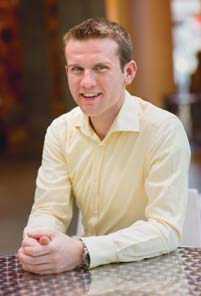This is the second in a series of profiles of our MIT Energy Fellows-graduate students who are supported by MIT Energy Initiative (MITEI) members to participate in faculty-led research and become part of a long-term community of students and alumni.

On the brink of his career as a chemist who hopes to mimic plants’ ability to make energy from sunlight, Andrew D. Horning is thinking about Frankenstein.
Horning, who majored in chemistry and minored in literature at the University of Southern California (USC), joined MIT in September as one of 39 MIT Energy Fellows. This inaugural, multidisciplinary group of doctoral students, sponsored by MITEI member companies, shares an interest in addressing the science, technology, and policy required to meet the global energy challenge and associated environmental issues.
Horning, sponsored by BP, wants to be the kind of scientist—like Mary Shelley’s 19th century creation, Victor Frankenstein—who “doesn’t always take the safest route, but the more interesting one. There is an element of risk-taking in science,” Horning says. A licensed sky-diver with more than 90 jumps to his credit, Horning aims to be a risk-taker in the laboratory. “I was always interested in how the outside world sees the scientist, and what it means to contribute to science and be a rebel,” he said. “You need part of that to be successful.”
“It’s easier to get a grant when you already know what the answer to a problem is, but if you’re willing to take a bigger risk, the payoff is much higher,” he said.
Still, the energy crisis is “not a problem that’s going to be solved overnight with some miraculous discovery,” he said. He’s looking forward to becoming immersed in basic research into the fundamentals of light and matter. As an undergraduate at USC, Horning won a slew of humanities honors as well as nabbing first prize in the science, math, and engineering category of the 2007 USC Undergraduate Symposium for Scholarly and Creative Work. His project: recreating the natural process of photosynthesis using artificial molecules fabricated from carbon-based polymers and using these to study the relationship between molecular geometry and energy transfer.
While he hasn’t picked a research adviser yet, Horning knows he likes exploring “biological systems on a molecular level as a guide to better understanding how we might harness solar energy or design devices that make energy the way plants do.
“I’m pretty much interested in exploiting the interactions of light with matter,” he said.
Growing up in the Pacific Northwest, Horning wandered trails and dug trenches for rainwater (experimenting with the concept of flow) in the hundreds of acres of forest and wetlands that surround his home in a town of 20,000 in a rural region of Washington State.
When he wasn’t out in the woods, he was reading. “I read everything. I was one of those kids who gets a pile of 15 books from the library and the next week returns them all and gets 15 more. I always kind of enjoyed classic literature—Jane Austen to the Odyssey to Herman Melville,” Horning said. Books give him “a different perspective on different places and different time periods,” he said.
Science was an equally powerful draw. At USC, he knew he wanted to major in science but didn’t settle on chemistry until the end of his sophomore year. “I thought I might major in physics or maybe biology,” he said. Chemistry won in the end because he liked the idea that the field is simultaneously theoretical and anchored in the fundamental workings of the real world. “It has direct applications. You can actually make things with it,” he said. “Chemistry has become very interdisciplinary. Chemists are able to look at atoms and explain large-scale behavior.”
Because Horning’s father is an airline pilot, Horning can fly anywhere within the US for free. So when he visited MIT and liked the city, the atmosphere, and the professors, he figured, why not switch coasts? “Home is a free plane flight away,” he said.
The subtitle of Shelley’s classic, “The Modern Prometheus,” refers to the Greek titan who stole fire from Zeus and gave it to mankind. The work of Horning and other MIT chemists may one day accomplish a similar feat: they hope to marshal energy from the sun, which pours more energy onto the Earth’s surface in an hour than the entire planet uses in a year, to meet future global energy needs.